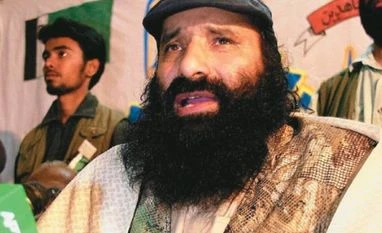Watchers of Kashmiri separatism are intrigued by an unexplained ideological turnaround by Tehrik-e-Hurriyat leader, Syed Ali Shah Geelani, and by Syed Salahuddin, the Hizb-ul-Mujahideen (Hizb) chief, who also heads the Pakistan-backed separatist alliance, United Jihad Council (UJC).
After years of insisting that Kashmiri separatism had no links with global Islamist fundamentalist movements like Al Qaeda and the Islamic State (IS, or Daesh), both Geelani and Salahuddin issued eulogies for Zakir Musa, the Al Qaeda-associated militant, who security forces gunned down in Pulwama, Kashmir, on Friday.
For Geelani and Salahuddin, Kashmiri nationalist identity is fundamental to their call for seceding from India, notwithstanding ideological differences over whether Kashmir should become a part of Pakistan or remain independent (azad). In contrast, Musa advocated that Kashmir be absorbed into a global Islamist khalifa(caliphate).
In 2017, Musa quit the Hizb to form the Ansar Gazwat-ul-Hind (AGuH), which Al Qaeda identified as its affiliate in Kashmir. Abandoning Kashmir nationalism, Musa publicly declared” “Kashmir’s war, particularly of the mujahideen, is only to enforce Shariah. It is an Islamic struggle.”
When Musa threatened to behead the Hurriyat leadership in Srinagar’s iconic Lal Chow, the Hurriyat Conference called Musa an India’s intelligence agent. Geelani declared that “Al Qaeda, Daesh or Taliban have no involvement or role in Kashmir.”
Yet, after Musa was gunned down on Friday, Geelani called for a hartal (shutdown), stating: “Whosoever strives for implementation of divine law in his land with his conviction and dedication, are the real heroes of the movement and nation is indebted to hail their precious sacrifices.”
Echoing this new line, Salahuddin issued a statement saying: “Zakir Musa sacrificed his life for the glory of Islam and the freedom of Kashmir.”
Just a week earlier, the Hurriyat and UJC had remained silent when one of Musa’s lieutenants, Ishfaq Ahmad Sofi was killed by security forces in Shopian. The Kashmiri media did not report his affiliation with the AGuH, nor his frenzied funeral, in which thousands of local mourners pulled off the Pakistani flag that covered Sofi’s coffin and replaced it with the Daesh flag. Remarkably, this took place in Sopore, Geelani’s hometown and bastion.
In contrast, Daesh wasted no time owning Sofi and announcing the setting up of the Islamic State of J&K (ISJK), which it referred to as “Wilayah al Hind”.
While traditional separatist leaders have said rising Daesh support is a New Delhi constructed plan aimed at discrediting the Kashmiri freedom movement, fundamentalist Islam has found growing acceptability amongst a new generation of Kashmiris.
Evidence has been mounting. In two earlier funerals in 2017, throngs of mourners replaced Pakistani flags on the coffins of slain terrorists with Daesh flags and chanted: “Na Hurriyat wali Shariat, na Hurriyat wali azadi, Kashmir banega Darul Islam (neither Hurriyat-style Shariat, nor Hurriyat-style liberation, Kashmir will become an Islamic state).”
Last December, masked men climbed atop Srinagar’s iconic Jamia Masjid and posted videos on social media of themselves waving Daesh flags and shouting pro-Daesh slogans. However, the UJC dismissed them as Indian spies.
With both Geelani and Salahuddin known to receive guidance from Pakistan’s Inter-Services Intelligence (ISI) agency, officials in New Delhi are evaluating whether their remarkable turnaround reflects a redirection of ISI’s support, from Kashmiri nationalists to fundamentalist Islamists.
Analysts within Kashmir, however, ascribe Geelani’s and Salahuddin’s praise for Musa to “societal pressure” to acknowledge the contribution of fighters who, while ideologically counterposed to Kashmiri nationalism, were sacrificing their lives for the same cause.
“In Kashmiri minds, all these strands are interwoven. Is it a religious struggle, or is it political? Over the years, leaders like Geelani have issued contradictory statements, so they can be interpreted in different ways. When Al Qaeda chief, Osama bin Laden was killed, Geelani stepped forward to hold funeral prayers for him in absentia,” says Mehmood ur Rashid, a commentator for Greater Kashmir newspaper.
This is born out at the operational level, where fighters from Kashmiri nationalist groups like the Hizb coordinate seemlessly with groups like Zakir Musa’s. With Musa killed, Riyaz Naikoo of the Hizb has become the Valley’s most wanted militant.
Meanwhile, there are mixed signals from Pakistan. On May 18, Islamabad reportedly sealed the offices of all 12 Kashmiri separatist outfits functioning from Pakistani Occupied Kashmir under the UJC. This was apparently under pressure from the Financial Action Task Force (FATF) on terrorist financing.
Unlock 30+ premium stories daily hand-picked by our editors, across devices on browser and app.
Pick your favourite companies, get a daily email with all news updates on them.
Full access to our intuitive epaper - clip, save, share articles from any device; newspaper archives from 2006.
Preferential invites to Business Standard events.
Curated newsletters on markets, personal finance, policy & politics, start-ups, technology, and more.



)